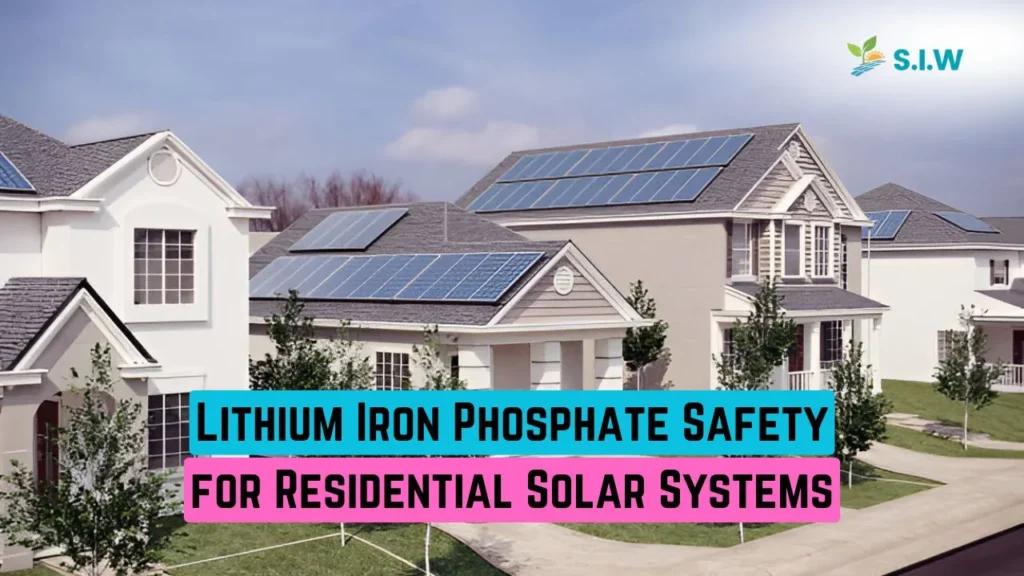As solar energy adoption grows in residential spaces, the focus on battery storage systems has become critical. One of the most reliable solutions for homeowners is lithium iron phosphate (LiFePO4) batteries. Unlike traditional lead-acid or lithium-ion batteries, LiFePO4 offers superior safety features, making it an ideal choice for residential solar systems. The need for energy independence, sustainability, and cost-efficiency drives the interest, but safety remains a top priority.
What is Lithium Iron Phosphate?
Lithium iron phosphate is a type of lithium-ion battery characterized by its use of iron phosphate as the cathode material. It boasts a higher thermal and chemical stability, which translates into lower risks of combustion or explosion. Compared to other battery chemistries, LiFePO4 offers a longer lifespan, lower energy density, and enhanced safety, making it particularly suited for home solar storage applications.
Role of Lithium Iron Phosphate in Solar Systems
LiFePO4 batteries are increasingly being integrated into residential solar systems due to their ability to efficiently store energy generated from solar panels. These batteries are designed to withstand extreme conditions while maintaining stable performance, even during long-term use. Their excellent discharge rates and deep cycling capabilities ensure that homeowners have reliable backup power during grid outages.
Why Safety is a Concern
While solar systems are generally safe, battery storage introduces additional risks, including overheating, fire hazards, and electric shocks. LiFePO4 technology addresses many of these concerns with its inherent safety properties, but understanding potential risks and how they are mitigated is crucial for safe residential use.
Safety Features of LiFePO4 Batteries
LiFePO4 batteries come with several built-in safety mechanisms that protect against thermal runaway, a major cause of fires in lithium-ion batteries. Features like temperature sensors, pressure valves, and protective circuits ensure that the battery operates within safe limits, minimizing the risk of overcharging or short-circuiting.
Fire and Explosion Risks: Myths vs Facts
One of the most persistent myths about lithium batteries is their propensity to catch fire or explode. However, with LiFePO4, the reality is quite different. These batteries are designed to resist high temperatures and do not release oxygen when overheated, which significantly reduces the risk of fire or explosion, making them much safer than standard lithium-ion options.
Installation Safety
Proper installation is key to ensuring the long-term safety of residential solar systems. Professional installation by certified technicians is recommended to prevent issues related to improper wiring or inadequate ventilation, both of which could lead to overheating and potential hazards.
Monitoring and Maintenance
Battery Management Systems (BMS) are integral to LiFePO4 batteries, monitoring parameters like voltage, current, and temperature. Routine maintenance, such as periodic inspections and performance monitoring, is essential to identify potential issues before they become serious safety concerns.
Durability and Longevity
One of the standout features of LiFePO4 batteries is their durability. With proper care and usage, these batteries can last for 10 years or more, significantly outlasting other battery types. Safe usage, such as avoiding deep discharges and maintaining proper charging levels, can further extend the lifespan of these batteries.
Environmental Impact
LiFePO4 batteries are not only safer for homes but also for the environment. They contain fewer toxic materials compared to other battery chemistries and are easier to recycle, reducing their environmental footprint. Proper disposal and recycling practices are essential to prevent environmental contamination.
Certifications and Standards
When purchasing LiFePO4 batteries for residential solar systems, it’s important to look for certifications that ensure safety and performance. Certifications like UL (Underwriters Laboratories) and IEC (International Electrotechnical Commission) are key indicators that the batteries meet industry safety standards.
Cost vs. Safety
While LiFePO4 batteries may come at a higher upfront cost compared to traditional battery options, their safety features and longevity make them a worthwhile investment. Homeowners must weigh the benefits of reduced risk and long-term savings against the initial expenditure.
Future of Lithium Iron Phosphate in Solar
As technology advances, we can expect even more innovations in LiFePO4 battery safety. From enhanced fireproof designs to automated BMS systems, the future looks promising for safer, more efficient residential energy storage.
FAQs
- Are LiFePO4 batteries safe for residential use?
- Yes, LiFePO4 batteries are among the safest options available for home energy storage.
- How long do LiFePO4 batteries last?
- These batteries typically last 10 years or more, depending on usage and maintenance.
- Do LiFePO4 batteries require maintenance?
- Yes, regular monitoring and occasional inspections are recommended.
- Can LiFePO4 batteries catch fire?
- No, LiFePO4 batteries have low fire and explosion risks due to their stable chemistry.
- What is the best way to install a LiFePO4 battery?
- Professional installation by a certified technician is highly recommended for safety.
- Are LiFePO4 batteries environmentally friendly?
- Yes, they are easier to recycle and contain fewer hazardous materials.
Lithium iron phosphate (LiFePO4) batteries offer a safe, durable, and environmentally friendly solution for residential solar systems. With their built-in safety features, long lifespan, and superior performance, they are the ideal choice for homeowners looking to adopt solar energy with minimal risks.








